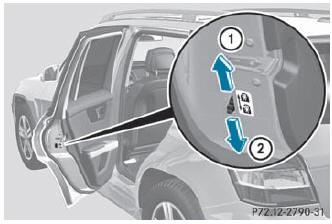 Mercedes-Benz GLK-Class: Child-proof locks for the rear doors
Mercedes-Benz GLK-Class: Child-proof locks for the rear doors
![]() WARNING
WARNING
Children could open a rear door from inside the vehicle. This could result in serious injuries or an accident. Therefore, when children ride in the rear always secure the rear doors with the child-proof locks.
You secure each door individually with the child-proof locks on the rear doors. A door secured with a child-proof lock cannot be opened from inside the vehicle. When the vehicle is unlocked, the door can be opened from the outside.

- To activate: press the child-proof lock lever up in the direction of arrow 1.
- Make sure that the child-proof locks are working properly.
- To deactivate: press the child-proof lock lever down in the direction of arrow 2.
 Important safety notes
Important safety notes
WARNING
When leaving the vehicle, always remove the SmartKey from the ignition lock.
Always take the SmartKey with you and lock the vehicle. Do not leave children unattended
in the vehicle, ...
 Override feature for the rear side windows
Override feature for the rear side windows
WARNING
When children ride on the vehicle's rear seats, activate the override switch.
Otherwise, the children could be injured, e.g. by trapping themselves in the rear
side window.
...
See also:
Cruise control*
Cruise control is an automatic speed control system that lets you keep the same
driving speed. It can be activated at 40 km/h (25 mph) or more.
CAUTION:
● When you do not wish to drive at a ...
Air conditioning system refrigerant and lubricant recommendations
The air conditioning system in your
NISSAN vehicle must be charged with the
refrigerant HFC-134a (R-134a) and the oil,
NISSAN A/C system oil Type S or the exact
equivalents.
The use of an ...
Fuses
Never replace a fuse with one having
a higher rating or with material
other than a fuse because serious
damage or a fire could result.
The fuses are designed to melt during an
overload to ...
